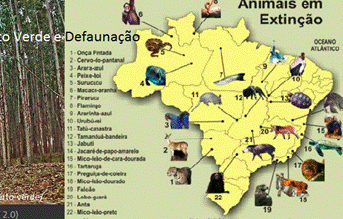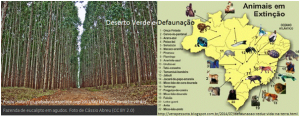
Green desert and Defaunação, Article Joseph Eustace Diniz Alves
"The forest precedes people
And the desert follows the " (Chateaubriand)
Brazil has destroyed 93% the Atlantic Forest, more than 50% Cerrado and over 20% Amazon. Degradation spared other biomes, such as Forest Groves, Wetlands, Caatinga, the Araucaria Forest, the Pampas and the Pantanal. Like this, Brazil, which does not think of restoring its original rich biodiversity, It has a lot of land, stolen forest, the provision of agriculture, reforestation and livestock.
Instead of replanting of native species, "industry" reforestation sought exotic forest species, as Pinus and Eucalyptus, that they have adapted well in Brazil, enabling productivity, no minimum, ten times greater than those of many temperate countries. The rapid growth of pine and eucalyptus plantations is due to favorable weather conditions, solo, territorial extension, labor, infrastructure and productive managerial capacity of companies that focus on profit and not the recovery of ecosystems.
Monocultures geared to profit not contribute to the recovery of biodiversity. The term "green desert" came to denote the only plantations a type of trees, as in large tracts of land intended for the pulp production, wood or charcoal. The consequences of this type of planting to the environment are: desertification, erosion and biodiversity reduction.
green desert, for example, It is when a forest has a sauna smell and no fauna. Generally, large plantations of pine and eucalyptus poison the soil, eliminate animal biodiversity, a flora do local, dry springs, They suck the water table and reinforce the land concentration.
The combination of eucalyptus disastrous, monoculture and pesticides also affects the health of people who produce food in nearby regions, because their lands are invaded by wild animals, no alternative, in search of food. Wild animals are victims of lack of habitat, the lack of ecological corridors and lack of compassion of producers who do not admit the "invasion" of their private land and the loss of some of their domesticated animals.
For the production of ethanol and biofuels, advances the monoculture of sugarcane, extruding animals, destroys environmental and literally Fritts those who can not escape the tongues of fire in places where cutting production is still done with fire, as in former times of slavery.
Most Brazilian ecosystems were destroyed and there are no green corridors to unite what little was left of the various biomes. The fauna and was also destroyed in small portions was islanded. The fauna of the loss is defined as "defaunation", which is leading to a mass extinction of small animals, medium and all sizes.
This process is global as is clear in studies published in July 2014 in the journal Science showing alarming rates of ecocide. According to the magazine, is causing the human, in a short time, the sixth mass extinction in the planet. This is due to the impact of the loss of life due to the depletion of vegetation cover, the lack of pollinators, the increase in diseases, soil erosion, the impacts on water quality, etc. So, the effects are systemic and one of the Science magazine article calls this process "defaunation the Anthropocene", which occurs due to the deepening of discrimination against non-human species.
Speciesism crime is far from being the subject of further discussion, as it happened with racism, sexism, classism, the homofobismo, slavery, etc. It was recently created a website to encourage the mobilization against discrimination of species, setting day 22 August 2015, as the "World Day against Speciesism".
The green desert and defaunation affect human life and non-human. For example, insects, including honeybees, that pollinated 75% of global agricultural production, suffering threat scale global, with the widespread use of pesticides. Similarly, They are threatened bats and birds that control agricultural pests, otherwise, would be devastating.
The declining population of amphibians - like frogs and toads - increases the concentration of algae and other debris, which compromises the quality of water resources. Vertebrates and invertebrates play a strategic role in the organic decomposition and nutrient cycling in the environment. Thus, the defaunation affects human health in different ways, from malnutrition to disease control.
In December 2014, the Ministry of Environment presented study showing that the number of endangered species in Brazil increased 75% between 2003 is 2014. The new national list of endangered species has 395 new species, most of terrestrial invertebrates. In addition there are numerous endangered species, because they are unknown to human records, simply did not enter the lists of extinction.
The growth of human activities in Brazil has undermined the harmful form all forms of life ecosystem of national biomes. Brazilians are reincidindo daily in speciesism crimes and ecocide. If the demographic and economic dynamics continue stifling the biological and ecological dynamics, Brazil destroy the planet's largest ecological area to contribute decisively to the civilizational chasm and ecological, generating a global suicide.
Campaigns / networks:
World Day against Speciesism: http://end-of-speciesism.org/
End Ecodide on Earth https://www.endecocide.org/en/
End Ecocide: A Global Citizens’ Initiative to Protect Ecosystems https://www.endecocide.org/wp-content/uploads/2014/09/EEE_booklet.pdf
Joseph Eustace Diniz Alves, Columnist Portal EcoDebate, a PhD in demography and professor at the master's and doctorate in Population, Territory and Public Statistics of the National School of Statistical Sciences - ENCE / IBGE; Presents his views in a personal capacity. E-mail: jed_alves@yahoo.com.br
Not published Portal EcoDebate, 18/03/2015
http://www.ecodebate.com.br/2015/03/18/deserto-verde-e-defaunacao-artigo-de-jose-eustaquio-diniz-alves/
Paragraph
"The forest precedes people


Sorry, the comment form is closed at this time.